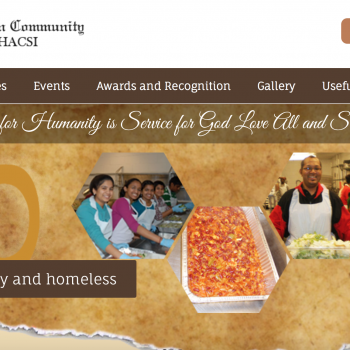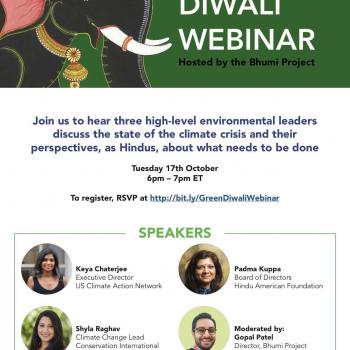As a Board member of the Hindu American Foundation, I have had the opportunity to share what advocacy is with some stellar college students who join HAF’s Congressional Internship program each summer. Current intern Tej Desai recently shared his experience after a month in DC where HAF’s main offices are, but it is former intern Suneeta Israni’s thoughts on the importance of the Hindu American Foundation’s annual Human Rights Report and its relevance to Article 26 in the UN Declaration of Human Rights that I share here. Her understanding of the issues – gained from personal experience and the professional experience of her summer internship – reflects the importance of engaging young people in advocacy as a means to creating a more peaceful, pluralistic world.
Suneeta Israni was part of the second cohort of the Hindu American Foundation’s Hindu American Congressional Internship and is now a second year student in the Master of Education Policy and Administration Program at Loyola Marymount University. In addition to pursuing her MA, Suneeta is currently serving her two-year commitment in a low-income community as a 2013 Teach for America Corps Member. Suneeta earned her BA in Psychology and Minor in Public Policy at UC Berkeley where she also served as a Chief Justice representing over 36,000 students. Her experience on Capitol Hill has encouraged her to consider a career in public policy and politics. (Views expressed below do not necessarily represent those of any organization of which she is a part.)
Preserving Human Rights Through Article 26
As an educator of history, my students and I have made a conscious choice to use a critical and culturally responsive lens when evaluating the subject matter in textbooks and the classroom. I say “my students and I” because I have adopted a teaching philosophy in which I, the teacher, am considered an equal amongst my students and that together we can learn from each other and work together to solve problems. I have adopted this philosophy because this critical and culturally responsive evaluation and reflection will afford my students the knowledge and skills they will need later on in life to persevere through bullying and prevent discrimination.
What does using a critical and culturally responsive lens to evaluate and deliver subject matter look like? It means starting with the dispelling of myths and the breaking down of various social constructs that have been provided to us within our very own textbooks. It means providing a platform for students to voice their opinions, even, question their beliefs. Unfortunately, providing such a platform for students is considered a privilege in many countries and not a right, despite the fact that Article 26 of the Universal Declaration of Human Rights enumerates that “[e]veryone has the right to education” and that “[e]ducation shall be directed to the full development of the human personality and to the strengthening of respect for human rights and fundamental freedoms. It shall promote understanding, tolerance and friendship among all nations, racial or religious groups, and shall further the activities of the United Nations for the maintenance of peace.”
According to the Hindu American Foundation (HAF)’s 10th annual human rights report, Hindus in South Asia & the Diaspora: A Survey of Human Rights, 2013, Pakistan is one of those countries that has failed to uphold Article 26 and is instead known as an egregious violator for engaging in or allowing rampant and systematic human rights violations to take place against non-Muslim populations. In Pakistan, women lack formal education for fear of abductions or fear of bullying. Those who do risk their lives to enroll in Pakistan’s education system encounter discriminatory language and factually inaccurate historical accounts in the textbooks. The ramifications for such government-sanctioned actions include the fostering of hatred and intolerance towards non-Muslims, including Hindus, Christians, and Jews. Modern Hindus are referred to as “gangsters”, even “eternal enemies” of Islam, while Christians are referred to as “violent crusaders.” Simultaneously, the majority of the education system in Pakistan promotes jihad only in its violent manifestation and not its non-violent form.
Interestingly enough, the current state of textbooks in Pakistan seems to worsen over years rather than improve. For example, the National Commission for Justice and Peace (NCJP) found that the textbooks used in Punjab currently contain 122 instances of anti-minority rhetoric compared to 45 recorded in 2009. And in Sindh province, the textbooks include 22 lessons with hate-based material, while in 2009 there were 11. (P. 129) Unfortunately, as the state of textbooks in Pakistan deteriorates, the options still remain very limited. The NCJP found that while the alternative ethics courses exist, in reality non-Muslim students are still forced to study Islam and enroll in Islamiyat classes. It should then come as no surprise that educational discrimination leads to the migration of many Hindus to India. And while many refugees hope that this relocation will provide a better future, in reality many refugee children in India have difficulty obtaining an education due to a lack of access and the absence of proper legal documentation to enroll in local schools. Even if refugee children are admitted, they face financial barriers and are often unable to afford basic uniforms and school supplies.
So what are some potential solutions? For starters, the U.S. Agency for International Development (USAID), which currently provides education funding to Pakistan, should make financial aid contingent on the Federal Education Ministry and provincial textbook boards implementing standardized curriculum reforms and working with publishers to print new textbooks that (1) promote religious pluralism and mutual respect, (2) remove inflammatory and negative content about minorities, and (3) segregate Islamic instruction from secular subjects. Failure to do so should yield temporary suspension of USAID’s funding until verifiable and meaningful steps have been taken to institute reforms. Additionally, teachers in Pakistan should have access to and be provided with quality professional development on how to craft pluralistic and culturally responsive content in order to deliver a truly socially just curriculum.
I focus on Pakistan not because Pakistan is the sole violator of Article 26 (Malaysia, Afghanistan, and Saudi Arabia are also a few of the many notorious examples that are well documented in HAF’s report), but because of my background as a Sindhi (an ethnic group from Pakistan’s southern Sindh province). I am familiar with this narrative because my very own grandparents, as Hindus, fled Pakistan due to a climate of intolerance and hatred towards the country’s religious minorities. And while I do not participate in Pakistan’s educational system nor live there, I, too, am deeply affected by this issue. Despite living in a “modern” age, I am unable to make pilgrimages to my ancestral homeland because I fear for my life with the high number of attacks and abductions that routinely occur at temples and other sites. And too often, this violence is rooted in the textbooks that inculcate young Pakistani minds with hatred for the “other.”
This is why I applaud and endorse the work of the Hindu American Foundation. While it is evident that the current state of education around the world blatantly violates the Universal Declaration of Human Rights, this issue has only drawn widespread attention recently with the tragic abduction of schoolgirls in Nigeria and the shooting of Malala Yousafzai in Pakistan. HAF, however, has been documenting similar, if not worse, historical accounts for more than a decade, and has shed long overdue attention on Pakistan’s own “missing” girls. HAF’s Hindu Human Rights Report serves as an annual reminder of these ever present issues and the need to actively engage policy makers on practical and durable solutions.
It is inspiration for why I committed to assisting in the research of this report and why I continue to stay committed to the profession of teaching in an underserved region – because protecting human rights and educating our future leaders within the framework of human rights will one day not only breed tolerant and global citizens but also promote the prevention of (rather than the reaction to) a nation’s many political, societal, and economic woes.














